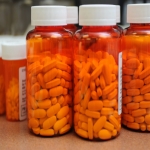
Surgery went great! There wasn’t any reason to take more than a day or two or prescribed pain medication and over the counter medicines worked. A few days before a follow up with the doctor, there is nearly a full bottle or pain pills left over. Throw them in the trash? Flush ‘em down the drain? Keep them for an emergency?
What do to do with all those pills?
Here are a few options for disposing of your unused or unwanted narcotic pain medications in a safe way.
Community Drug Take Back Programs

Many pharmacies and drug companies partner up with local communities and offer a safe way to dispose of unwanted or unused medications, no questions asked. Collectors are registered with the DEA as an authorized site, and can often be found at hospitals, clinics, or pharmacies. You can visit the DEA website or call 1-800-882-9539 for more information. This not only keeps medicine cabinets clear of clutter and unused pills, but helps prevent misuse by unintended persons.
Injuries and deaths in teens and young adults from opioid drug abuse has risen in recent years due to the ease of getting pills from their parents, grandparents, or close neighbors bathroom rather than off the streets. Removing these medications from the household as soon as they are not needed helps to remove the danger of abuse or accidental overdose. Call the local police stations non-emergency line or visit their website for more information about community based disposal programs.
At Home Disposal
A lot of medication inserts and instructions will have disposal recommendations. If there are no instructions and no community based disposal programs in the area, there are some easy steps to take to dispose of unwanted medications:
- Remove them from their bottle and mix them up with some undesirable substance, such as coffee grounds or kitty litter. This makes them less appealing to garbage eating pets or children. It also helps make the drug less recognizable to anyone going through the trash looking for drugs.
- Place the mixture in a sealed bag, jar, or can that will not leak or fall out of the garbage on trash day.
When disposing of the bottle itself, remove or scratch out all identifiable information from the bottle. This helps protect personal and protected health information and from someone trying to pick up any refills left on the prescription.
Unused or unwanted medications should never be given to anyone that it was not prescribed to.
The medication was for a purpose, and the doctor performed a comprehensive health history review prior to prescribing it. A friend or co-worker could have a complicated health history, allergies, or be taking other medications that could have serious interactions. Trying to help a friend could cause serious, life threatening situations. It is easy to get rid of it the right way and make the community a safer place for everyone.
By: By: Riki Duncan, MA. Ed, ATC, LAT
Sources:
https://www.fda.gov/forconsumers/consumerupdates/ucm101653.htm
http://www.medreturn.com/communities

